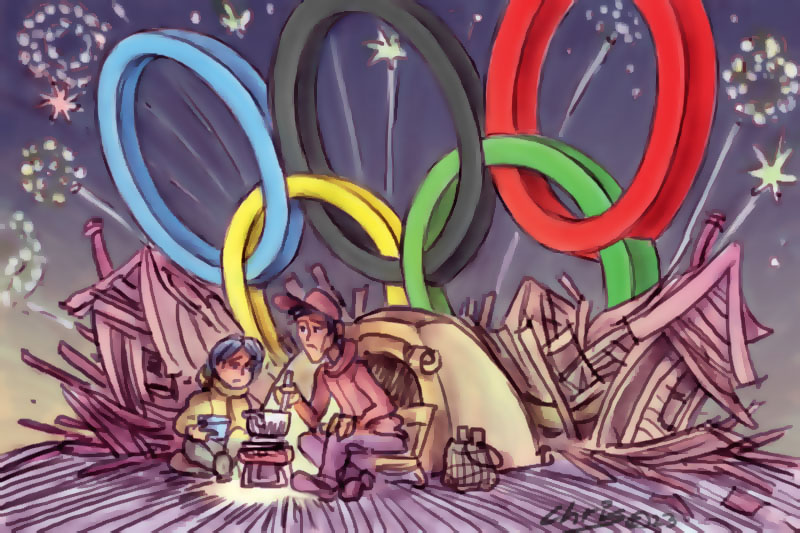As Brisbane prepares to host the Olympics and Paralympics, state and federal governments are getting ready to spend billions of dollars on new sports infrastructure. Meanwhile, homelessness is on the rise in our fair city. According to the Salvation Army, 1.97 per cent of Brisbane residents are homeless. Housing has become unaffordable here, as it has in most Australian cities. As more tents pop up along the Brisbane River, I can’t help but remember the fate of the homeless during the 1996 Olympics in the city where I grew up.

When Atlanta first won the bid for the Games, there were promises made about how this would ‘put us on the map’ and be great for Atlantans. Not all of us.
Just before the games came to town, they gave homeless people a one-way bus ticket out of the city. Those that refused to go went to jail; 9,000 homeless people were arrested.
The city also destroyed an inner-city public housing project, Techwood, to build housing for athletes. The Washington Post explains how, ‘Techwood was one of the nation’s oldest examples of publicly subsidized housing, but the new replacement townhouses could only house a fraction of the former residents . . . . Of the 4000 people who lived in Techwood, only 78 were able to return, post-Olympics.’
The 2032 Olympics could be an opportunity to build affordable housing in Queensland, but the focus is currently on new stadiums, not housing. The Brisbane Times reports that the new Woolloongabba stadium ‘will cost more’ than the estimated one billion dollars. The plan is to tear down the old stadium and East Brisbane State School—all this to add just 8,000 seats to ‘the Gabba’, as it’s called.
I recently spoke with a plumber who does maintenance on the Gabba, and he’s shocked that they’re going to demolish the stadium. ‘It’s a got a lot of years left in it,’ the plumber said. Dr Amy MacMahon, local MP for South Brisbane, says residents are extremely concerned: ‘There’s a school at stake. There’s a local park at stake. The Gabba is only 25 years old. Will we rebuild it again in 25 years?’ MacMahon says there has been ‘no community consultation.’
The Olympics always cost more than what analysts predict. The Japanese estimated in 2013 that their Olympics would cost $2.8 billion; The 2020 Tokyo Olympics ended up costing $28 billion.
'Even if tourism increases because of the Olympics, this won’t necessarily be good news for affordable housing. With increased tourism, comes an increase in Airbnbs, which take affordable units and houses off the market for long-term renters.'
Forbes Magazine points out that, ‘in Sarajevo, Athens, Beijing and Rio to name just a few cities . . . crumbling stadia and Olympic villages serve not as proud monuments to athletic achievement, but rather as sombre symbols of catastrophic financial mismanagement.’
Queensland Premier Annastacia Palaszczuk claims the Brisbane Olympics are a ‘golden opportunity’, but for whom? CEDA (the Committee for Economic Development Australia) reports that the Brisbane Olympics will deliver and estimated, ‘$8.1 billion in direct economic benefits to the QLD economy and create 91,600 jobs over the next 20 years’. That sounds good, but other host cities have had similar rosy estimates and they’ve all been wrong. The Sydney Morning Herald reports the ‘Sydney’s Olympics resulted in an overall decline in household and government consumption of $2.1 billion between 1997 and 2005.’
Economist John Quiggin at the University of Queensland says, ‘I don’t buy most of the arguments about tourism benefits from sporting events. I saw a recent observation that, while some people may go to Kazakhstan to watch the Moto GP, no one is going to visit the place later because they saw it on TV.’
Even if tourism increases because of the Olympics, this won’t necessarily be good news for affordable housing. With increased tourism, comes an increase in Airbnbs, which take affordable units and houses off the market for long-term renters.
But it’s not all doom and gloom. Brisbane isn’t Atlanta, and this could be an opportunity to showcase egalitarian Australian values. MacMahon sees an opportunity, too. She suggests being creative. Why not use existing infrastructure in former host cities?
This idea is echoed in a New York Times piece on how to improve economic outcomes for the Olympics: ‘If we were living in a rational world, we would have the same city hosting the Games every two years. There’s no reason to rebuild the Olympic Shangri-La every four years. When the modern Olympics were created in 1896, we didn’t have international telecommunications and international jet travel.’ This is no longer the case. It’s time to make use of infrastructure already built.
We need to ensure that money spent by taxpayers on the Brisbane Olympics benefits everyone, and not a select few construction companies. In a recent conversation between Premier Palaszczuk and MP MacMahon, the Premier said, ‘once the village is finished with, we can turn it into housing.’ That’s hopeful, but they said the same in Atlanta 1996 and London 2012 and it didn’t happen. After 23 years, Sydney is still working on converting their Olympic Park into affordable housing.
It’s time we learn from past mistakes. It’s time for community consultation and new creative ideas. ‘In my community,’ MP MacMahon says, ‘people love the Games and want to be excited about hosting the Olympics. Let’s give them something they can be proud of.’
Sarah Klenbort is a writer and sesional academic at Queensland University, where she teaches creative writing. She also teaches memoir at the Queensland Writers Centre. Sarah's work has appeared in Eureka Street, The Guardian, Best Australian Stories, Overland and other publications here and overseas.
Main image: Chris Johnston illustration.